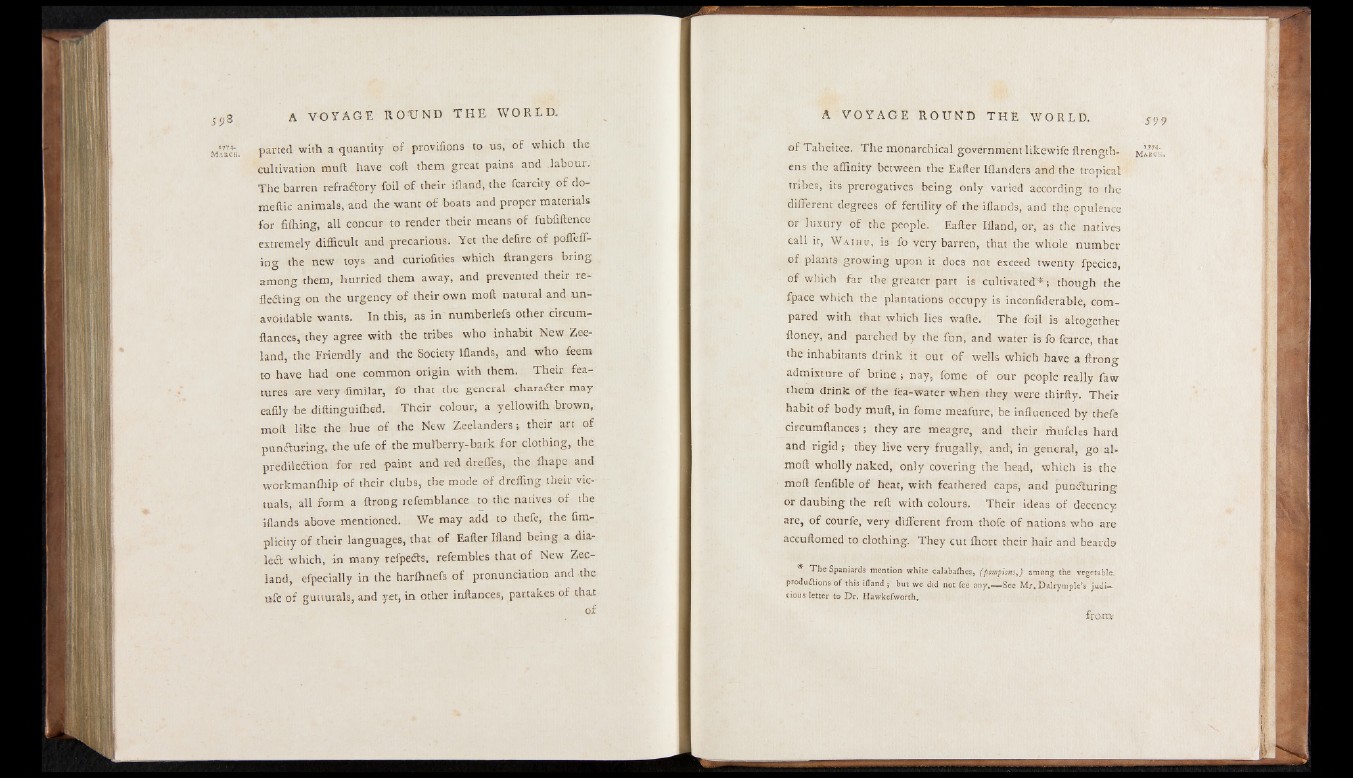
M^ci. parted with a-quantity of provifions to us, of which the
cultivation muft have coft them great pains and labour.
The barren refraftory foil of their ifland, the fcarcity of do-
meftic animals, and the want of boats and proper materials
for fi.fh.ing, all concur to render their means of fubfiftence
extremely difficult and precarious. Yet the delire of poffeff-
ing the new toys and curiolities which ftrangers bring
among them, hurried them away, and prevented their reflecting
on the urgency of their own molt natural and unavoidable
wants. In this, as in numberlefs other circum-
ftances, they agree with the tribes who inhabit New Zee-
land, the Friendly and the Society lflands, and who feem
to have had one common origin with them. Their features
are very fimilar, fo that the general character may
e a f i l y ‘be diftinguiffied. Their colour, a yellowiffi brown,
molt like the hue of the New Zeelanders; their art of
puncturing, the ufe of the mulberry-bark for clothing, the
predilection for red paint and red dreffes, the fhape and
workmanftip of their clubs, the mode of dreffing their victuals,
all form a ftrong refemblance to the natives of the
illands above mentioned. We may add to thefe, the fim-
plicity of their languages, that of Eafter Ifland being a dia-
leCt which, in many refpeCts, refembles that of New Zee-
land, efpecially in the harffinefs of pronunciation and the
ufe of gutturals, and yet, in other inltances, partakes of that
5 9 9
of Taheitee. The monarchical government likewife flrength-
ens the affinity between the Eafter Iflanders and the tropical
tribes, its prerogatives being only varied according to the
different degrees of fertility of the illands, and the opulence
or luxury of the people. Eafter Ifland, or, as the natives
call it, W a ih u , is fo very barren, that the whole number
of plants growing upon it does not exceed twenty fpecies,
of which far the greater part is cultivated*; though the
fpace which the plantations occupy is inconfiderable, compared
with that which lies wafle. The foil is altogether
ftoney, and parched by the fun, and water is fo fcarce, that
the inhabitants drink it out of wells which have a ftrong
admixture of brine ; nay, fome of our people really faw
them drink of the fea-water when they were thirfty. Their
habit of body muft, in fome meafure, be influenced by thefe
cireumftances ; they are meagre, and their mufcles hard
and rigid ; they live very frugally, and', in general, go ah
moft wholly naked, only covering the head, which is the
moll fenlible of heat, with feathered caps, and punfturing
or daubing the reft with colours. Their ideas of decency
are, of courfe, very different from thofe of nations who are
accuftomed to clothing. They cut ffiort their hair and beardo
T h e Spaniards mention white calabaihes, (po/npiom3) among the vegetable,
productions of this ifland ; but we did not fee any,— See Mr. Dairympie’s judi—
cious letter to Dr. Hawkefworth.
from?